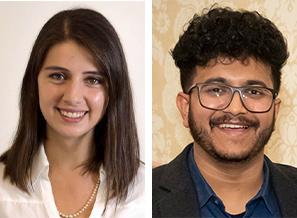
Two former Duke graduate students are the recipients of the 2020 Harold M. Weintraub Graduate Student Award, which recognizes outstanding achievement during graduate studies in the biological sciences. Victoria Deneke and Nandan Gokhale, both whom graduated from Duke in 2019, were announced by the Fred Hutchinson Cancer Research Center today as recipients of the annual international award.
Victoria Deneke completed her PhD in Cell Biology in 2019 and is now a postdoctoral scholar at the Institute for Molecular Pathology (IMP) in Europe. While at Duke, she worked in the laboratory of Stefano Di Talia, PhD, an assistant professor in the Department of Cell Biology, studying the organization principles of the embryonic cell cycle in Drosophila melanogaster. Deneke was the first author of two research publications and two reviews articles in the journals Seminars in Cell and Development Biology, Development Cell, Journal of Cell Biology, and Cell. She was the recipient of several academic fellowships and honors, including: HHMI International Student Research Fellowship (2016), Schlumberger Faculty for the Future Fellowship (2015), Duke BioCoRE Scholar (2013), Boehringer Ingelheim Fonds Travel Grant (2018), JCB Norton B. Gilula Travel Award (2018), Journal of Developmental Biology Travel Award (2018), ASCB Travel Award (2017), and Duke Regeneration Next Travel Award (2017). Deneke was one of the co-founders of Duke INSPIRE.
"I am very happy that Victoria was selected for this award,” said Di Talia. “In her PhD thesis work, Victoria embraced the interdisciplinary and collaborative approach that was needed to make progress on the important question of control of the cell cycle and nuclear positioning in early embryogenesis. Through her work, we have gained novel insight on how self-organized biochemical and mechanical signals can ensure precision of developmental processes."
Nandan Gokhale completed his PhD in Molecular Genetics and Microbiology in September 2019. He is now a postdoctoral scholar at the University of Washington. For his graduate work, which was funded by an American Heart Association Pre-doctoral Fellowship, Nandan worked in the laboratory of Stacy Horner, PhD, assistant professor in the Department of Molecular Genetics and Microbiology, studying how the RNA modification N6-methyladenosine (m6A) regulates infection by viruses like hepatitis C virus, dengue virus, and Zika virus. Gokhale’s work revealed that m6A acts directly on viral RNAs to regulate specific stages of infection. He has also identified infection-induced changes in m6A modification of cellular mRNAs which can modulate the function of these RNAs and ultimately impact the outcome of infection. Together, these findings illuminate how m6A dynamically regulates the host response to RNA virus infection and why it matters.
“Nandan is one of those rare individuals that as a graduate student demonstrated truly exceptional creativity and achievement in research,” said Horner “He has an insatiable appetite for scientific learning and engagement, as well as an innate enthusiasm for science, that made mentoring him an absolute delight. As a graduate student in my lab, he performed ground-breaking research that has defined how the post-transcriptional RNA modification m6A regulates infection by RNA viruses in the Flaviviridae family.”
The Weintraub Award is named for Dr. Harold “Hal” Weintraub, who helped found the Basic Sciences Division at the Fred Hutchinson Cancer Research Center and died of brain cancer in 1995 at age 49. The award honors Weintraub’s scientific leadership in the field of molecular biology and his legacy as an extraordinary mentor, colleague, collaborator and friend.